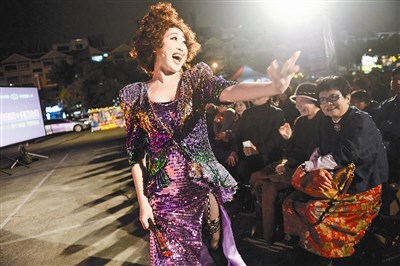 為了將愛與歡樂回饋觀眾,成軍二十二年的金枝演社啟動下鄉巡演計畫,足跡遍布全台各地鄉鎮,帶來讓人笑中帶淚的精彩好戲。圖/莊坤儒
為了將愛與歡樂回饋觀眾,成軍二十二年的金枝演社啟動下鄉巡演計畫,足跡遍布全台各地鄉鎮,帶來讓人笑中帶淚的精彩好戲。圖/莊坤儒
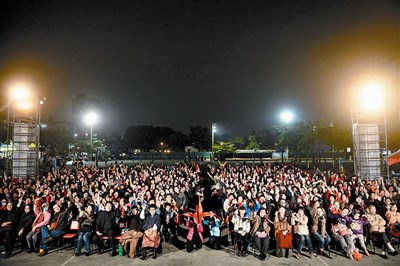 藝術不是抽象難懂的語彙,既能大眾也能古典的金枝演社,誓言要將觀眾帶回戲棚下。圖/莊坤儒
藝術不是抽象難懂的語彙,既能大眾也能古典的金枝演社,誓言要將觀眾帶回戲棚下。圖/莊坤儒
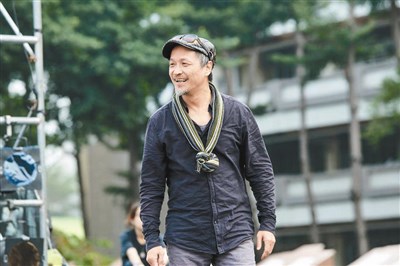 出身於歌仔戲世家的金枝演社創辦人王榮裕,將野台戲班的草根文化融入現代戲劇。圖/莊坤儒
出身於歌仔戲世家的金枝演社創辦人王榮裕,將野台戲班的草根文化融入現代戲劇。圖/莊坤儒
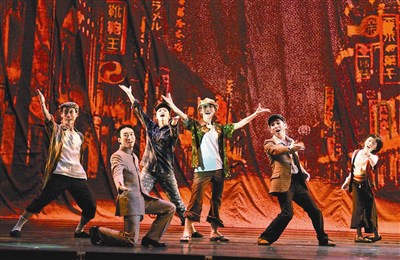 《浮浪貢開花》系列3〈勿忘影中人〉。
圖/莊坤儒
《浮浪貢開花》系列3〈勿忘影中人〉。
圖/莊坤儒
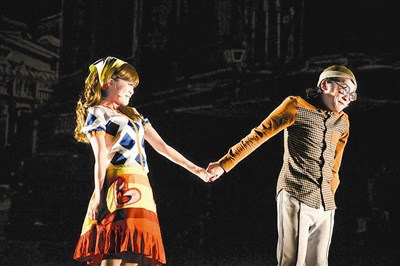 金枝演社下鄉演出的《可愛冤仇人》。圖/莊坤儒
金枝演社下鄉演出的《可愛冤仇人》。圖/莊坤儒
文/劉嫈楓 圖/莊坤儒
(摘錄轉載自104年8月《台灣光華雜誌》全文請參考http://www.taiwan-panorama.com/)
提 要
「人生無處不戲劇!」新竹五峰雲霧氤氳的深山裡、桃園大溪人聲鼎沸的夜市旁,都有創團二十二年的金枝演社與觀眾一同創造的感動與回憶。
為了將愛與歡樂回饋觀眾,民國九十八年金枝演社啟動的「金枝走演,美麗台灣」計畫,至今已走遍了一百二十多個鄉鎮。不說大道理、不讓藝術變得難懂,充滿誇張動作、捧腹台詞的金枝演社,要讓全台觀眾回到戲棚下,大笑連連。
All the world's a stage, and the 22-year-old Golden Bough Theatre has embraced this idea wholeheartedly, touching audiences with performances in locations as diverse as the misty mountains of Wufeng, Hsinchu County, and beside a bustling night market in Daxi, Taoyuan.
In an effort to bring love and joy to more audiences, in 2009 Golden Bough Theatre began its "Golden Bough Across Taiwan" program, which has seen the troupe perform in over 120 small towns around Taiwan. Rather than being about highfalutin' philosophies and artistic abstruseness, Golden Bough's performances are more focused on exaggerated motions and belly laughs, aiming to entice audiences back to the theatre with non-stop entertainment.
For his meeting with Taiwan Panorama, Golden Bough Theatre's founder and creative director Wang Rong-yu specially brought along a copy of a hand written flyer for a performance 22 years ago, just after the troupe was founded.
The simple black-and-white photocopy, barely A4 sized, recalls a very different time for the troupe, which today comprises 14 administrative staff and performers. "Golden Bough was built up by Taiwanese audiences over the years, ticket by ticket," says Wang. It was the memory of this support that inspired Wang in 2009 to take several of the troupe's shows on the road, including She is So Lovely..... and Midsummer Night's Dream, giving something back to the audiences that had been so supportive.
Golden Bough's touring performance project has seen them travel the length and breadth of Taiwan, putting on over 120 performances over five years in locations as diverse as Niaosong in Kaohsiung City, Zhuang wei in Yilan County, and Wufeng in Hsinchu County. In addition to entertaining rural audiences, the project also aims to bring some joy to a country that has long been beset with melancholy and anxiety about the future. Even more importantly, though, the "Golden Bough Across Taiwan" project is hoping to sow the seeds of a vibrant art scene in rural Taiwan.
Wang Rong-yu grew up in the theater, his mother a player in a Taiwanese Opera troupe in the Wanhua–Guting area of Taipei City, allowing Wang himself to be a witness to the glory days of the form as audiences packed the house. Today, though, Taiwanese Opera's glory has faded, and audiences are down to "three dogs and a couple of god statues," sighs Wang.
As a young man, Wang thought of Taiwanese Opera as low class for its use of the Taiwanese language. It was only after nearly three decades of work in the theater, after starting at age 28, that he was able to reflect and finally understand how Taiwanese Opera represents Taiwan's grassroots. It was that understanding that led to Golden Bough incorporating modern elements into the traditional form of Taiwanese Opera, "koa-á-hì," to reinvigorate it, creating their own form of "ôo-phiat-á."
Even many Taiwanese find themselves befuddled by the name ôo-phiat-á, being left with the impression that it's something a bit hickish and weird-sounding. The term dates back to Japanese rule of Taiwan, when in an effort to "Japanize" the Taiwanese, Taiwanese theater was banned; ôo-phiat-á, derived from the word "opera," describes the variant form of Taiwanese Opera that developed in response, combining the traditional form with the Japanese language and more modern musical elements.
When Wang founded Golden Bough, he was inspired by the exaggerated nature of ôo-phiat-á, taking it and recombining it with grassroots Taiwanese Opera to create a unique Golden Bough style of ôo-phiat-á. This "grassroots DNA," which helps the troupe's performances feel familiar to small towns across Taiwan, "helps us bring audiences back to Taiwanese theater," says Wang.
About six months into the touring project, Golden Bough was described by a theater critic as "one of the few troupes in Taiwan that is capable of creating shows for the whole family as well as theater redolent with classical style and rituality." This October, Golden Bough is preparing to bring one of their classics, Troy, Troy..... Taiwan, back to the stage at Cloud Gate’s theater in Tamsui after a ten-year break.
Wang describes Troy as a show with its finger on the pulse of Taiwanese society. First performed in 1997, with a revival in 2005, the show has always enjoyed close links to Taiwan’s political and economic situation.
Troy began as an attempt to translate the story of the Trojan Horse, but Wang soon realized that the story's setting of Troy had much in common with Taiwan—both being caught between great powers, and both being rising states thanks to their position as trading hubs, a status making them strategically important to other states. The intent of the final product is to remind us to treasure Taiwan, lest she share the same fate as Troy did nearly three millennia ago.
Growing up around the theater and founding his own troupe made their marks on Wang Rong-yu, helping him build a troupe capable of capturing audiences with a classical art form. Through innumerable performances over nearly three decades, he has been tireless in his pursuit of artistic excellence. Exclaims Wang, "It’s only this year that I’ve gotten to grips with what art actually is!"
翻 譯
訪談開始前,金枝演社創辦人兼藝術總監王榮裕特地拿來二十二年前創團不久後,劇團在台北公館人性空間表演時,一張手寫的宣傳字條。
不到A4大小、黑白影印的紙張,對比現今足以供養十四名行政人員與演員的劇團規模,「這都是台灣觀眾以一張張門票餵養出來的金枝演社。」王榮裕說。這份惦記在心的感激,讓王榮裕決定在九十八年帶著《可愛冤仇人》、《仲夏夜夢》等多齣精彩好戲下鄉走演,回饋觀眾。
金枝演社的偏鄉巡演計畫目標走遍全台,在高雄鳥松開始第一場後,五年多來已經完成一百二十多場,宜蘭壯圍、新竹五峰都有他們的足跡。雖然遠遠落後於當初設定在一年內巡演全台三百一十九鄉的期程,但王榮裕樂觀地笑說,「再五、六年,我們就可以達成目標!」
在回饋鄉親之餘,金枝演社希望為悶了許久、對未來充滿焦慮的台灣帶來歡樂。更重要的目的是希望藉著巡迴演出,在地方撒下藝術的種子。
王榮裕認為,被手機、電腦、電視綁架的現代人距離藝術越來越遠。很多人以為去過一趟巴黎羅浮宮、聽過貝多芬《第5號交響樂》,就等同於接觸藝術,「但真正的藝術欣賞是不論何時想起、聽到,隨著人生當下的處境、心情,都有不同的體會。」王榮裕說。
曾經在雲門《流浪者之歌》擔綱僧人一角的王榮裕,引述林懷民對他說過的一番話,「如果能把民眾騙離電視、電腦,哪怕是幾十分鐘,只要來到現場,就是功德無量。」儘管藝術播種的工作,最終可能只有幾顆種子開花結果,「但如果不做,一切都不會發生。」王榮裕說。
這不是金枝演社首度嘗試走入地方的演出。民國八十一年,王榮裕以母親謝月霞的故事為藍本創作的《胡撇仔戲─台灣女俠白小蘭》,就在龍蛇混雜的夜市以野台演出;八十八年,為了撫慰九二一地震後災民的心情,金枝演社團開著卡車巡迴災區演出。
從小在戲班長大的王榮裕,母親是艋舺、古亭一帶的當家歌仔戲小生。演出時人山人海的盛況,讓王榮裕親眼見證了台灣歌仔戲的極盛時期。如今歌仔戲的昔日榮光不再,台前觀眾冷清地只剩「三隻小狗、兩位神明」,讓他備感唏噓。
在物質匱乏的年代,歌仔戲是台灣社會藝術養成最直接的所在,舉凡酬神敬謝、農民收成割稻都會邀來戲班表演。因此,和王榮裕同輩或上代的創作者,作品的配色、構圖多少都見得到歌仔戲與布袋戲留下的影子。
二十八歲才從事劇場工作的王榮裕坦承,年輕時因為母親的戲子身分、操著台語,一度覺得歌仔戲沒水準,直到從事劇場工作近三十年回頭再看,才懂得本土的歌仔戲如此代表台灣特色。因此,金枝演社將歌仔戲的野台特色融入現代戲劇,進而形塑出「胡撇仔美學」。
許多人乍聽「胡撇仔」一詞,心中不免疑惑究竟是什麼。但聽來有點土、有點台、有點古怪搞笑的名稱,其實是在日據時代禁演台灣戲曲的時代氛圍下,民間混搭日語、各種歌曲變通創造的庶民表演,其發音正是來自英文「opera」。轉譯為中文後,呈現出胡撇仔戲通俗而親民的性格。
到了王榮裕創辦金枝演社時,便將舊日胡撇仔戲誇張通俗的特色挪移到創作,再加上台灣歌仔戲草根文化,孕育出「金枝演社版本」的胡撇仔戲。因此,身上本來就帶著「野台草根DNA」的金枝演社來到地方鄉鎮演出自然不陌生,「更要把觀眾帶回來戲棚下」。王榮裕說。
巡演計畫邁入下半年,曾被劇評家評為是台灣少數「既能寫出闔家同歡的大眾戲劇,也能端出古典、充滿儀式性的戲劇作品」的金枝演社,十月也準備在淡水雲門劇場重新演出睽違十年未演的劇作《祭特洛伊》。
王榮裕表示,《祭特洛伊》是一部貼近台灣社會脈動的劇作。從八十六年首度演出、九十四年二度公演以至今年再次推出,都和台灣所處的政經局勢息息相關。
當初創作《祭特洛伊》時,王榮裕曾翻遍了希臘神話故事,後來發現特洛伊城的背景與台灣極其相似。同樣位處兩大洲域疆界,因緊扼交通要塞,使得這座小城自古以貿易興國,卻也成為各國眼中極具戰略意義的地方。推出這齣劇作意在提醒大家珍惜眼前的台灣,否則將步上三千年前特洛伊城的命運,「希望以古喻今。」王榮裕說。
從小在戲班長大、後來加入優劇場,兩道不同的藝術養成過程都在王榮裕身上留下軌跡,也造就了金枝演社既能大眾也能古典的表演路線。做戲近三十年,經過無數場的舞台鍛鍊,過去汲汲於追求藝術極致的王榮裕,「今年,終於懂了什麼是藝術!」他說。